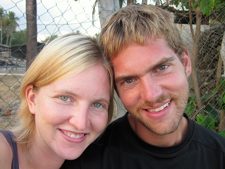This trip is truly my first chance to immerse myself in new cultures. And the more I learn about Guatemalan culture, the harder I find it is to explain how we do things in Canada.
In Canada, we often think of countries like Guatemala as “have-not” countries riddled with violence and poverty. What we don’t bother to consider are all the positive aspects of the culture. Like:
- The abundance of fresh, local, and organic fruit and vegetables. If mangoes aren’t in season, you can’t buy them. If you purchase fresh meat, odds are really good that the animal was raised just outside (or maybe inside) town and was slaughtered that morning.
- Less waste. If something still works, it’s not replaced every few years with something newer.
- Everyone takes public transportation.
- Less debt. While the average person does not have much money, they are also not in debt.
In Canada, on the other hand, the average person is in debt and will spend between 25 and 30 years of their lives that way. We borrow money to pay for what I now realize are massively oversized homes, new cars, and bigger and better stuff.
After ten or fifteen years of living in the same house that we still owe the bank money for, we will somehow find the extra cash needed to renovate it or buy a bigger one. It’s the same with buying new cars. Worst of all, despite our high salaries and “high standard of living”, our food is rarely fresh or local. The majority of it has traveled farther than we could ever hope to.
Now, try to explain to a Guatemalan that our way of life is superior.
Now don’t get me wrong… Guatemala is not Utopia. It has more than its share of problems. According to the World Bank, 51% of the population is living at or below the national poverty line. Many families in San Pedro live off of beans and tortillas three meals a day, as they can’t afford to buy the fresh produce or meat in the markets. Recent history is full of bloody violence (that I can’t help but feel some guilt for as a North American). Non-profit organizations can be found in every town and city to help poor kids go to school and get enough to eat, as there is no government assistance.
Still, the people I meet in Guatemala are HAPPY with their lot in life. They accept that there are many economic and governmental problems, but are still hopeful that change will happen. They value their family, their friends, and their health above everything else. Work stays at work and as for money, they get by with what they’ve got (with a smile on their face). They know that life can be hard at times, but they never forget to really live that life. Not a bad way to live, huh? It makes me question the Canadian mindset that bigger is better and that we should spend our entire lives working to accumulate stuff.
Before we left, we sold our house. Sell vs. Rent was a big, long drawn out debate for us… and the fact that our house was “too small” definitely factored into it. In retrospect, our house was not too small. In fact, it seems huge now. (As my Spanish teacher says, it was a mansion). We actually had a whole room we hardly ever used except to store stuff that we never used. How can that be too small?
Every day I encounter new ideas that challenge and shift my worldview. I am definitely not the same person that stepped onto that plane three months ago and I already have a different set of priorities for my life. If Guatemala has taught me one thing, it’s that less is more. Now hopefully I can live that principle.




